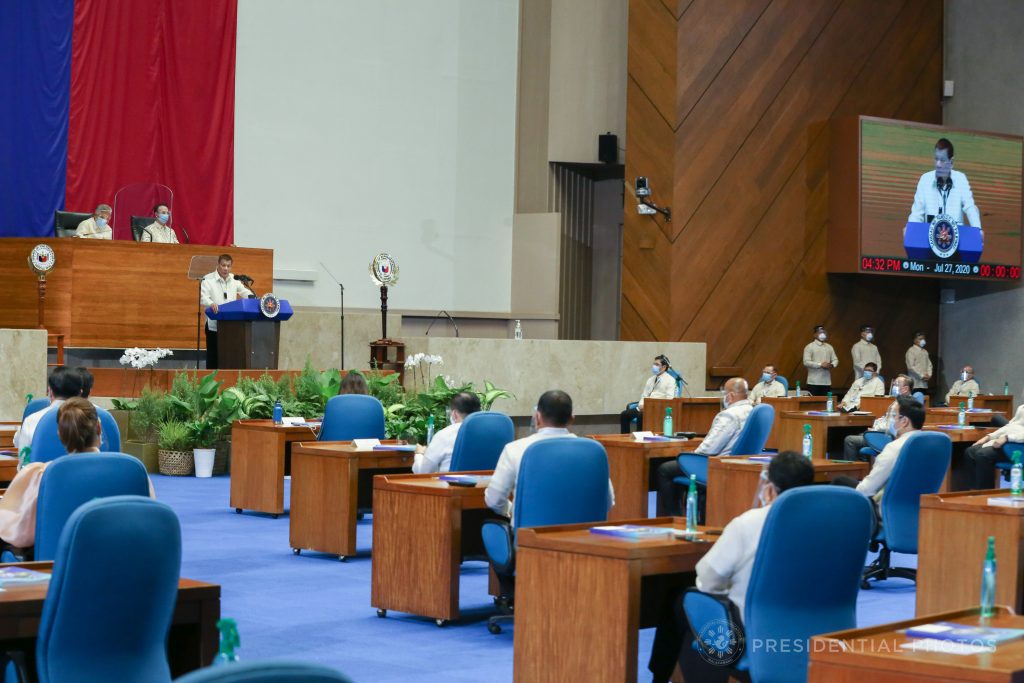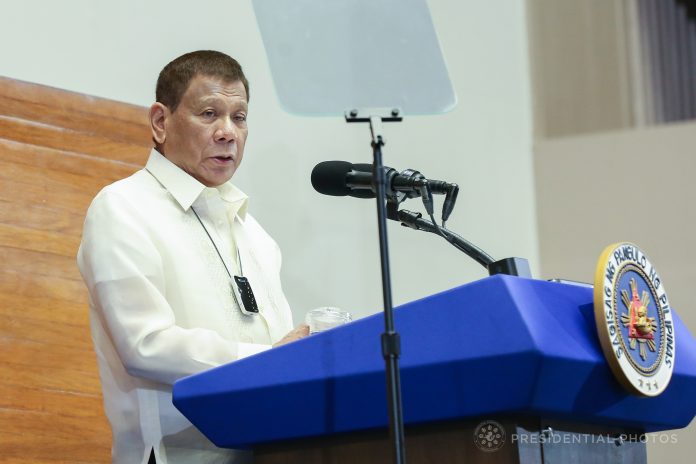Critics awaiting Philippine President Rodrigo Duterte’s fifth State of the Nation Address on July 27 braced for an extended riff on the new anti-terror law and his trademarks threats ordering police and soldiers to kill enemies.
Duterte barely mentioned the new law, which is facing more than 20 legal challenges at a Supreme Court packed with his appointees. The lack of thunder and lightning, however, did not reassure lawyers and journalists.
His off-the-cuff remarks traced a roadmap to full-blown dictatorship, according to journalist Vergel Santos of the Center for Media Freedom and Responsibility.
Fresh from his victory over broadcast giant ABS-CBN, which lost its free-service frequencies when Congress denied its franchise last July 10, Duterte used the event to threaten other news corporations and industries needing franchises.
He also bannered his powers to seize companies and private property.
“TV frequencies reverted back to the government for whatever cause or reason [shall be used] exclusively to the exclusion of [private] persons or [their] dummies,” Duterte said.
“His message was I can nationalize frequencies,” Santos said at a SONA post-mortem forum. “That’s the end of press freedom in broadcasting, a big sword over everybody’s heads.”
State propaganda machine
Duterte said he would use frequencies, like those lost by ABS-CBN, to ramp up education in the new normal.
“These will be used to provide uninterrupted quality education to our children in our shift to e-learning,” he said.
ABS-CBN responded with an offer to use their transmission facilities and the thousands of educational modules they have produced for decades.
Duterte, however, made it clear that state media would handle the new operations.
The takeover of ABS-CBN’s frequency comes with the military’s growing power over policy-making functions, including developing the economy, all the way to the grassroots.
Senior Armed Forces officials had gone around schools before the COVID-19 lockdown, lecturing on how to protect the nation from its “enemies.”
While their presentation includes major rebel groups, both of the communist and Islamic militant varieties, the bulk casts legal dissenting groups as pawns or active allies of “terrorists.”
The government killed an independent news platform for a takeover by state media, a sector that has chucked out journalism standards and ethics to push the military’s propaganda goals.

‘Flex’ address
Right after the reference to media, the president also announced: “For the remaining two years of my term, all that is good that belongs to government, whether it be the airwaves, whether it be the lines, or whatever that is good for the people, will belong to the government and it should be government who should be given the first option to utilize them.”
Duterte threatened the telecommunications giants, Globe and Smart, if they fail to improve services by December. He also fulminated against water companies, insisting it is useless to renegotiate inimical contracts.
These key sectors need the government’s blessings to operate.
While there are laws laying down the process of exacting accountability from erring providers, Duterte implied that legal protections are blocking the government from doing its job.
Krissy Conti, a convenor of the Concerned Lawyers for Civil Liberties, used a millennial term to describe Duterte’s SONA strategy.
“This was a flex,” even if he did not mention the anti-terror law, she said.
“He showed off his calling out powers over the military, ordering them to help in peace and order, even barangay (grassroot villages) development, and these are not the [Armed Forces’] tasks,” Conti said.
“He is saying, the police and the military are mine, and I can bring them anywhere I want to, even beyond their mandates,” she added.
Conti also cited Duterte’s directives to shift budgets passed by law to other areas, even though his emergency COVID-19 powers have lapsed.
“He is telling us, ‘I am the most powerful person in the Philippines today and I can make all of government do my bidding.’”
Cronies ascendant
His most frightening flex, she stressed, was boasting about the state’s power of expropriation.
Duterte premised his threats on the historic abuses of the oligarchy. But Santos, who makes it a habit to spot the president’s “Freudian slips,” said Duterte clearly justified helping those who help him get rich.
That’s a classic recipe for cronyism. Regulatory capture is the arbitrary use rules to punish enemies and ease the way for friends.
Lawyer Wilfrido Garrido noted that despite threats against telecom firms, Duterte seems to ignore lapses of his friend, Dennis Uy, who holds the third telco franchise in the country.
Uy’s franchise came with conditions: to put up 2,500 cell towers by July 2020 and to cover 37 percent of the population, among others, and a US$500 million performance bond at stake.
Garrido noted the NTC’s new “common tower policy” gifts Uy a free ride on the telco’s existing towers. The Armed Forces even agreed to host cell towers in military camps.
[In 2019, the Philippine military signed a preliminary agreement with Mislatel, a consortium controlled by Philippine tycoon Dennis Uy, to install communications facilities and towers at its camps and installations.]
Whether using illegal drugs or terrorism or national security as an excuse, Duterte’s eyes have always been on other goals, Conti said.
“After all those threats, he practically surrenders the West Philippine Sea,” she pointed out. “This is not really about what the government needs but what Duterte wants and what his friends want.”
Dictatorship sacrifices its victims on many altars. It takes many forms, depending on the temper of the times and technology. In the end, it has only one real goal: corruption and using power to amass wealth.
Inday Espina-Varona is an award-winning journalist in the Philippines. She is a recipient of the “Prize for Independence” of the Reporters Without Borders in 2018. The views expressed in this article are the opinions of the author and do not necessarily reflect the editorial stance of LiCAS.news.









